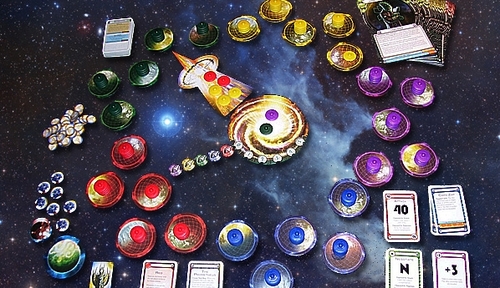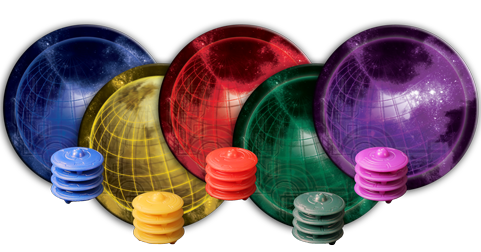.jpg) |
| Play It Again, Sam |
I've been told that Cosmic Encounter is "a game that should have meant even more than it did." I'm not sure exactly how to interpret that, but I assume it means that if CE were released today, in our surge of attention for games, that it would be an instant classic.
But wait... it's already an instant classic! From all the way back in 1977, Cosmic Encounter continues to be a fantastic game. Read on, intrepid gamer!
In Cosmic Encounter, players compete to be the first to have five colonies on other worlds.
Thematically, players are alien races striving to prove their worth in the cosmos. To do so, each player goes through a series of skirmishes that possibly lead to establishing colonies. The beauty of these Cosmic Encounters is in the tentative alliances that are formed as players try to wrest and maintain control of various colonies. Each battle in CE is an opportunity for a new alliance to form, or an established one to be severed!
Each player begins the game with five planets, each populated with four ships of the player's color. These ships will be used for attacking other planets and defending the player's own, and for allying with other players when needed. Players receive eight encounter cards that are used for fighting and negotiating during encounters.
Each player then receives two Flare cards, and is handed the Alien cards that correspond with those cards. Players secretly select one of those two Aliens to play. These Alien cards have wildly variable abilities, from boosting defenses and attacks to manipulating the core rules of the game. The Alien powers are the heart of Cosmic Encounter, and the staggering number of them available (well over 40) provides for fundamentally different experiences each game. Alien powers can be lost, stolen, or replaced by various effects in the game, and the presence of power abilities often dictate alliances and strategy during the game.
Players take turns acting as the aggressor in a series of pseudo-conflicts with other players. Through tactical prowess, careful negotiation, and sheer luck, each player attempts to get his or her ships on other players' worlds. To do so, players must do one of three things:
- Successfully attack another planet
- Negotiate to place a colony on an opponent's world
- Ally with a successful attacking force
.jpg) |
| Mostly harmless! |
At this point the main players (attacker and defender) each have the opportunity to ask for alliances from other players. This is the meat of Cosmic Encounter, the thick, wonderful part of the game that draws so many gamers back. Alliances are fickle and often fleeting, so each player has to correctly judge the state of the game before deciding who to fight with, or whether to fight at all.
Each player who allies with the attacker or defender places 1-4 ships (taken from any colony) on either the Hyperspace Gate (if allying with the attacker) or next to the defending planet (if allying with the defender).
Allying is incredibly important in Cosmic Encounter. If a player allies with the attacker and the attack is successful, the allying player receives a new colony exactly as the attacker does. Given that only five are needed to win, this can be a quick path to victory. However, the active player is allowed to choose the players he or she asks for help, so negotiation is more delicate than it may at first appear.
A player who allies with a successful defender receives the defensive rewards just as the defensive player does, which can grant the player new encounter cards or a reprieve for those ships trapped in the Warp (where ships go when they die). In Cosmic Encounter, successfully allying is the surest path to victory!
Once the lines of battle have been drawn and allies have taken their sides, each of the main players chooses one encounter card from their hand to play. These cards are revealed simultaneously, and could be one of three things:
1. An attack card: Attack cards have a printed value that is added to the number of ships (including allied ships) involved in the attack or defense of the planet. If a player plays an attack card and the other player plays a negotiate card, the player with the attack card automatically wins the encounter.
 When a player wins an encounter, all of the losing ships are sent to the Warp. If the attacker was the winner, his or her ships and allies' ships establish colonies on the conquered planet. If the defender won, the attacker's ships and all allies' ships are sent to the Warp, and all allies get to draw a card from the encounter deck or take a ship from the Warp for each ship they contributed to the encounter.
When a player wins an encounter, all of the losing ships are sent to the Warp. If the attacker was the winner, his or her ships and allies' ships establish colonies on the conquered planet. If the defender won, the attacker's ships and all allies' ships are sent to the Warp, and all allies get to draw a card from the encounter deck or take a ship from the Warp for each ship they contributed to the encounter.2. A negotiate card: Negotiate cards indicate submission on the part of the attacker or defender in exchange for cards from the winning player's hand equal to the number of ships lost in the battle (called compensation). Allies of the negotiator do not receive this benefit!
If both players play a negotiate card, they have one minute to come to a mutually agreeable deal for cards, colonies, or favors within the rules of the game. If the players fail to agree in the alloted time, both lose three ships to the Warp.
3. A morph card: A morph card simply copies the card played by the opponent, including the value of an attack card. Play proceeds as though both players had played the exact same card.
Once the encounter is completely resolved, the active player may initiate another encounter if that player won the first encounter of the turn. If not, play passes to the next player. In this way, play proceeds until one or more players have five colonies established on other player's worlds.
.jpg) |
| Gross |
If you love negotiation and tactical play, Cosmic Encounter should be in your game library. It's enough to say that the game has been loved by three generations of gamers. Though the components and decks might seem daunting at first, in my experience the analysis paralysis quickly fades and it's easy to focus on scheming with friends.
Cosmic Encounter provides what I assume so many people love about Munchkin - a no-holds-barred race to the finish line amidst continuous risk of backstabbing and tenuous alliances. CE also gives players a well-defined, simple, and especially compelling set of mechanics that make each encounter one worth fighting (or negotiating!) over.
We so easily get swept up in our "golden" age, but please don't let this gold standard of social strategy games collect dust any longer. If you own Cosmic Encounter, pull it out on your next game night and give an old friend a fresh look. If you don't own it, grab a copy from your local game store and give your gaming friends a reason not to trust you!
Tom Vasel's review of Cosmic Encounter at Dice Tower
Quinns reviews Cosmic Encounter at Eurogamer.net
Video review of Cosmic Encounter at Starlit Citadel
Rule Book (Fantasy Flight Games version)
Rule Book (Avalon Hill version)
--
JR Honeycutt is a full-time husband and game-player, and co-host of The Nerd Nighters. You can find him on Twitter at @JayAhre or at a Friendly Local Game Store in Dallas/Fort Worth, Texas. Some of his reviews are also published in Ravage Magazine or at Tabletop Gaming News.



No comments:
Post a Comment
Keep it classy, nerds!